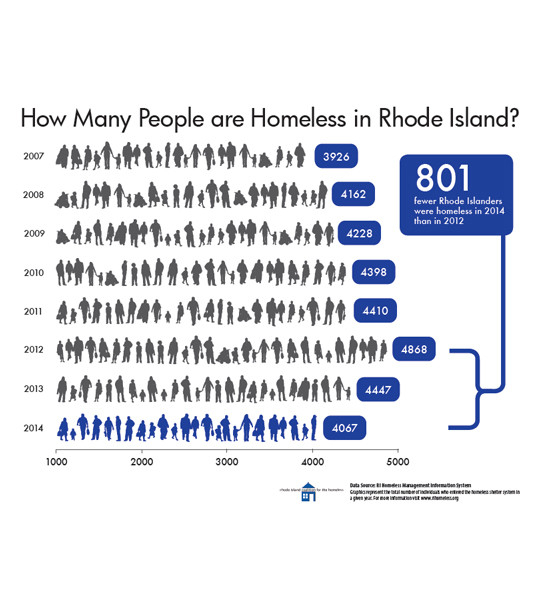
PROVIDENCE – Rhode Island’s homeless population declined for the second year in a row in 2014.
Advocates also graded the state’s efforts to end homelessness at a B, saying there is more work to do.
Data on homelessness was released Thursday at the Smith Hill Community Development Corp.
“The numbers are down but we are far from done,” Jim Ryczek, executive director of Rhode Island Coalition for the Homeless, said in a statement.
“We know from the past that now is not the time to take our foot off the pedal in our efforts to end homelessness,” he said, referring to the mid-2000s when Rhode Island cut services to the homeless just before the economic recession hit. “State leaders are looking for cost-savings in the budget, so it is important to understand that housing Rhode Islanders experiencing homelessness costs less than relying on shelters that weren’t made for the purpose of housing people. The best way to spend less money on homelessness is to end it.”
Eric Hirsch, a professor at Providence College and chairman of state Homeless Management Information System Committee, released the 2014 annual statistics showing an 8.5 percent decrease in the number of homeless Rhode Islanders to 4,067 in 2014 from 4,447 in 2013. In 2012, homeless Rhode Islanders totaled 4,868.
Hirsch’s report showed a 15.2 percent decrease in homeless families, to 535 in 2014 from 631 in 2013. There also was an 11 percent decrease in homeless children, to 986 last year, from 1,117 in 2013.
According to Hirsch, two-thirds of the decline in homelessness is due to fewer people entering the homelessness system, with a large portion of the decline attributable to fewer parents and children in the system. He said these families may be living with relatives or friends.
Hirsch said that the state should capitalize on the reduced number of homeless by investing in housing for them.
RICH’s report card, “Opening Doors Rhode Island: Strategic Plan to Prevent and End Homelessness,” gave Rhode Island an overall grade of B, an improvement over 2013’s C+.
It said that much of the improvement is due to successes in creating a source of funding for housing and homelessness, and the successful Medicaid expansion and enrollment.
“This is a real improvement,” said Ryczek, “We but we feel that Rhode Island is a state which must continue to work toward an A+ grade.”
Progress on the five major goals of Opening Doors RI include:
- Increase the supply of and access to permanent housing that is affordable to very low-income households – B- and improving (previously was a C-)
- Retool the homeless crisis response system – A- and improving (previously was a B+)
- Increase economic security – B- and stalled (previously was also a B-)
- Improve health and housing stability – C+ (previously was a C+)
- Increase leadership, collaboration and civic engagement – B+ and improving (previously a C)
The coalition’s specific recommendations for the coming year for the governor and General Assembly include restoring $2.17 million in the state budget to fund programs of the Housing Resources Commission. Also, in keeping with the funding called for in Opening Doors RI, RICH recommends that $12.5 million be allocated to continue the Building Homes Rhode Island program previously funded through a 2012 bond initiative passed by voters.
Said Anthony Maione, president and CEO of United Way of Rhode Island, “In 2014, we received 110,240 requests for housing and shelter-related needs, up 8 percent from 2013. We’ve made progress but there is still more to be done, by investing in permanent supportive housing and wrap-around services we can end chronic homelessness in Rhode Island.”












